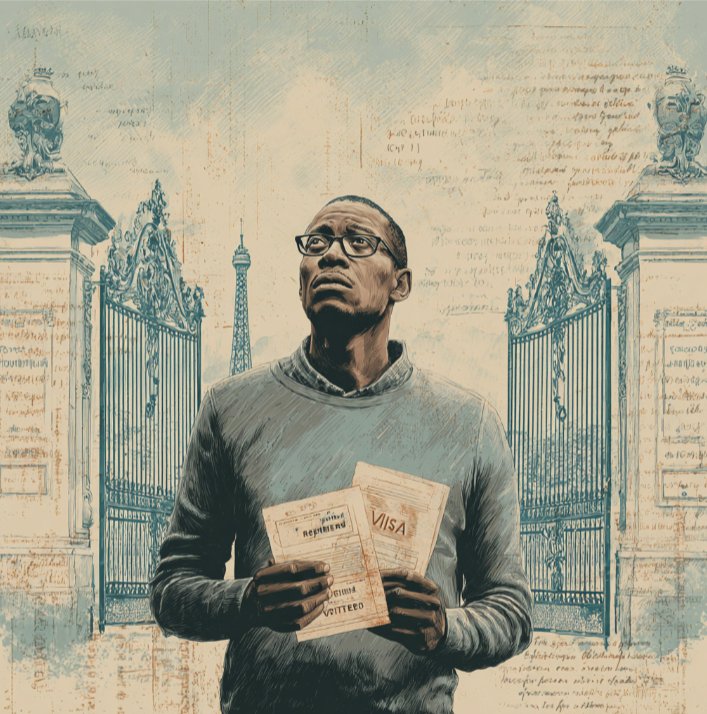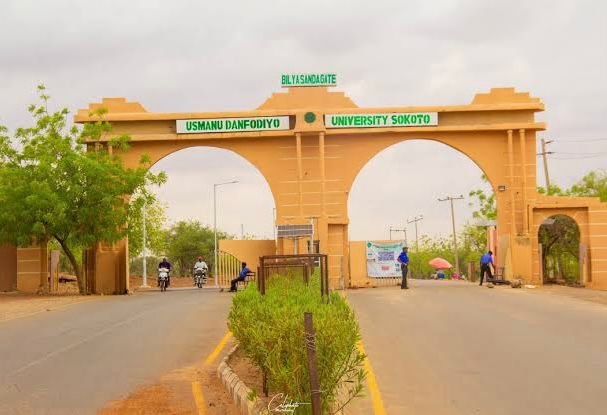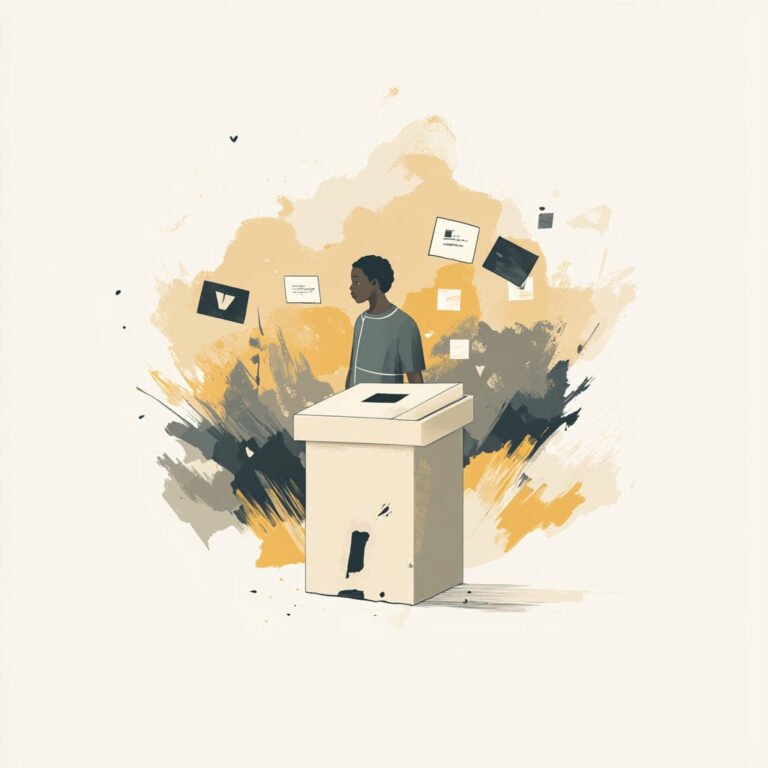Since 2018, Stephen Odelewo Olabisi’s hope of obtaining his academic transcript after he successfully completed a degree in geography and environmental management and graduated in 2017 from the University of Ilorin became a mirage. Seven years down the line, his unalloyed dream of pursuing a Professional Master degree in his field to complement his geographical consulting firm remains hanged.
“It is so unfortunate that I couldn’t get my transcript to pursue my dream for about eight years that I’ve finished my undergraduate programs. I can’t explain how I feel but I know I’m not happy with this development because it has affected my life,” Stephen said.
As part of his final-year school fees payment schedule, Olabisi had paid for the transcript and was just waiting for its collection in 2017 because all graduates are expected to have a copy, but couldn’t obtain it even after he completed his National Youth Service, a one-year mandatory programme for Nigerian graduates below the age of 30, in 2018 despite several efforts.
“I followed up with the University but nothing positive was done. All that they keep telling me were stories and that I should continue to come back. They were only directing me to offices, one after the other and all to no avail,” he revealed.
Olabisi had to stop pursuing what he termed as ‘mirage’ until September 2021 when he got a positive response from the Postgraduate admission office of Loughborough University at London where he had applied earlier to study International strategic management, an Msc Taught Programme in the university.
But at this time, Olabisi had to forgo the earlier payment he made during his final year for the transcript, while he initiated a new process online and made a new payment in the same year, hoping that could end his waterloo but nothing changed. This means that Olabisi paid for the same transcript two terms without even getting it.
“The only document that was missing and needed for admission then was my academic transcript. The university gave me a deadline but I didn’t meet up. That was how I lost the opportunity,” he recalled.
When contacted for comments, Dare Akogun, the Unilorin’s Director of Corporate Affairs, said the university operates a digitized transcript collection process which normally takes 24 hours for delivery, and it could take between 48 to 72 hours to deliver if the student’s spreadsheet is unavailable. However, Akogun refused to comment on the student’s issue with the University despite emphases.
The transcript is the comprehensive documented record that includes a graduate’s grades. It consists primarily of course units completed, exams passed and credit units earned. However, several graduates of Nigerian universities lost opportunities because they couldn’t get their transcripts on time, while many of them boycott the process and pay extra charges to those who could help them fast track it.
Research shows humiliation, mockery
Although there is no official record of the number of opportunities lost or graduates who have lost opportunities due to delay in obtaining a transcript. However, a paper published in the journal of Computer Science and Information Technology in 2013 noted that “Millions of Nigerian universities’ graduates have suffered untold hardship, humiliation, mockery and deprivation as a result of their inability to retrieve their transcripts from their respective homes”. The blame was laid at the door of the paper recording system adopted by many schools.
The researchers further stated that, because of inability to obtain transcript as and when due, many graduates miss many opportunities such as oversea learning, job opportunities and promotion in their respective workplaces. They suggested an electronic model as a solution.
Another study to find out the implications of poor management of students’ academic records established that lack of government policy, lack of skilled manpower with necessary competence in record management, delay in records retrieval and security as part of the challenges.
While the study posited that the National Universities Commission (NUC) had once suspended the operating licenses of seven private universities in Nigeria for reasons ranging from non-compliance with its regulations, poor management of academic activities and mismanagement of students’ examination records in 2012, it also cited lack of records management policy; poor attitude towards records management, lack of storage facilities for academic records, lack of computers for electronic records management, loss of data due to computer breakdown or virus attack, lack of training for staff maintaining the records and improper security for records as causes of poor management of students’ academic records in the university.
Cumbersome, stressful process
In Nigeria, obtaining academic transcripts from Nigerian universities remains a significant challenge and its delay has cost many Nigerian graduates to lose life-changing opportunities, especially scholarships and dreamed jobs, over the years while the country’s higher education institutions admit nearly 2 million students and produce about 600,000 graduates in each academic year.
Anas Chika is another promising Nigerian graduate who fell victim to the delay in getting academic transcripts, costing him two vital scholarships. Studied Medicine and Surgery at Usmanu Danfodiyo University Sokoto and graduated in 2019, Chika’s dream was to secure a fully-funded scholarship to further his studies abroad. He eventually did but none of the two scholarships he got materialized, delay in obtaining his transcript is why.
“The whole process is cumbersome and stressful because one needs to be physically seen before he gets his transcripts. It wasn’t a pleasant experience at all. I lost two vital opportunities two of which were masters program; one Master’s in Healthcare management in Indira Gandhi National Open University in India, and the other is Master’s in One health at the University of Edinburgh through a Masters card foundation scholarship,” Chika said, noting that he followed up with the offices concerned but he later gave up while such a university that has been founding as far back as 1975 should have improved and digitized the process.
Following a directive from the UDUS Spokesperson, this reporter reached to the institution’s Academic Secretary, Mr. Sunday Abuh for comment. Abuh didn’t respond to questions posed to him.
Several graduates interviewed said the manual process of obtaining transcripts is tedious, stressful and time-consuming. While several of them said they have lost opportunities owing to the delay, they call for a digitized and fast system.
A Ray of Hope
While a handful of Nigerian universities process academic transcripts manually, there are several others who have initiated an online transcript system for effective service. Institutions in the latter category include University of Ilorin, Ahmadu Bello University, University of Benin, Lagos State University, Federal University of Minna, Olabisi Onabanjo University, University of Maiduguri and many others.
In these universities, a digitized transcript application means a page is provided on the school’s portal where students and alumni can easily navigate, fill in their details according to requirements, make payment and receive their academic transcripts within one to seven working days.
Kamaldeen Biodun Iliasu graduated from the University of Ilorin in 2017, studying Agriculture. When he applied for a master’s degree in Agricultural economics abroad, he didn’t have his official transcripts yet with him but he knew he could get it within a short time by applying online.
“I browsed the University of Ilorin website for the application guidelines, followed it by making payment through Remita, then filled the application form through the link provided on the website. And I got it between 2-3 weeks of application,” Iliasu said in an interview, describing the process as a “hitch-free experience, and easy against the physical one which is costly and tiring”.
Though the process is smooth in Iliasu’s view, he believes the management of the University needs to improve the tracking stage of the application which will enable an applicant to monitor the process, and know whether the transcript is sent for approval or not.
Sultan Quadri is a graduate of Mass Communication at the Lagos State University. He didn’t have his academic transcript in his possession until a few hours to the deadline of a journalism opportunity he applied for which lately required him to upload his academic records. It was this process that saved him from losing this opportunity.
“I paid a required sum of 13k, followed the instructions, filled the form and got the soft copy of the transcript within an hour,” Quadri revealed, noting that the process is very easy, and commending the management of LASU for putting such a system in place.
Not Without Glitches
Oyindamilola Bisola, a graduate of Mass Communication from the Olabisi Onabanjo University (OOU) in 2012, applied for her transcript electronically in 2023 but couldn’t make a successful payment on the portal. At this time, she couldn’t get an assistant to help her out and follow the process physically, even when she needed the document for academic and professional progressions. She had to wait till 2024, the following year when she might have enough time for the process. But still in 2024 for the second attempt, she is facing a dilemma.
“I was told the payment I paid didn’t reflect. When I heard that, I was perplexed and I know I submitted the payment. I had to get somebody to assist in checking my portal and we discovered that there is nothing wrong with it. Of course, they’ve been difficulties and challenges. It was just showing errors all the time I attempted proceeding to the next stage,” she told this reporter in a sober voice, adding that an agent she got to process the transcript for her charged exorbitant fees because she graduated fourteen years ago and her results are yet to be digitized.
She said: “I’ve lost both career and academic opportunities because anyone I see that requires uploading a transcript, I will leave it despite the fact that I’m qualified and it is only the transcript pushing me back. Up till now, I’m still yet to get it. This is one of the reasons why alumni who needed transcripts urgently go through illegal means by hiring someone to help them get it.”
Bisola therefore pleaded with the management of her institution to address all the difficulties and bottlenecks surrounding an online transcript application process.
When contacted for comments on Bisola’s case, Dr. Wale Balogun, OOU Spokesperson, didn’t respond to the issue but rather asked the concerned alumni to register her complaints to the ‘appropriate channels’.
For Ibrahim Yusuf who is a graduate of Engineering at the Federal University of Minna and had applied for his transcripts online, the process was easy in the start but tiring in the end. This is because the transcript application system is a blended type in Yusuf’s school- both online and physical stages.
“When I successfully paid online and downloaded the receipts and the filled form. I was instructed to submit all these documents for verification and stamping at the bursary department which I did. From there, I was directed to the transcript office but I couldn’t get it easily for about a month. It was only when I involved a staff that I finally obtained the transcript,” Yusuf said, saying that it is shameful that a reputable institution like his own hasn’t passed through this stage.
We are Working- Universities
This reporter reached out to some spokespersons of some Nigerian public universities to understand the nature of transcript processing and collection as well as to get official reactions to some claims by their alumni. Almost all of them admitted that the manual process could take up to 2 weeks or longer in rare cases but they all denied knowledge of alumni losing opportunities because they couldn’t obtain their transcripts.
Dr. Umar Goni, the Director of Examination and Records at the University of Maiduguri, said that the university is already transitioning from a manual system to a digitalized one, the process, he said, is necessary because of the changing nature of practice in the world and large volumes of academic records files his office deals with.
“We are dealing with over 600,000 academic records in my office, starting from 1975 when the university had its first exams. It takes from two days to two weeks for a transcript to be processed, as it depends on the circumstances. The problem we do face while processing transcripts is from academic records. This is because a student might have taken a course whose computational sheet carrying his grades were not readily available, or not given to us. In this case, we have to trace the records to the department, retrieve the information and generate a new sheet,” Goni said in an interview.
Responding to claims about some alumni losing opportunities due to delays in getting their transcripts and hardships faced in the process of application, Goni said that no alumni had contacted his office to explain the urgency of his application, explaining that if such was done, the transcript would have been attended to and processed swiftly.
“In order to reduce the bottlenecks and time consuming issues, we’ve recently developed a digital platform and adopted a new system of digitizing the entire process, and all academic records from 1975 when the university had its first exams till date are on the process of computation electronically. This, when done, will allow a graduate to obtain his transcript within one or two hours at his comfort zone,” he said, noting that the directorate prioritized records of alumni from 20 years downward because they are likely to request and need a transcript for further studies or promotions.
Goni further said that there are a lot of the university’s alumni from 2010 who have explored the digital platform developed by the school to obtain their transcripts within one hour.
Manual Transcript is Against Global Practice
Ambali Abdulkabeer, an academic and quality education advocate, said that transcript processing, which is manual, is against the global practice, and remains a big challenge in many Nigerian universities because it is characterized by needless bureaucratic processes, lack of proper records and slow decision making, and the implications of its delay has affected tertiary education in the country and has caused many graduates to lose interest in postgraduate studies.
“It is taking the country and our tertiary education system backward. One of the ways it affects the country is that the nation might lose vivacious talents who are supposed to use their education to facilitate national developments. Since a transcript contains everything about the student’s academic performance, schools abroad would have to get them official. Since the process of getting it in most schools is not easy, how will that motivate the applicants and promote our schools?”
“Universities that operate a digitized transcript process should be commended. This signals some progress that must be replicated by others. It also typifies the urge to catch up with global trends. However slow the process, the progress is commendable,” Abdulkabeer revealed, explaining that such universities need to improve their technology strength and make the platform seamless for applicants.
He also said: “Universities don’t have to wait for graduates to apply for transcripts before the processing will start. Since the records are there already, transcripts should be prepared alongside statements of results. And students’ copies should be made compulsory for all graduating students at cheaper fees,” noting that there is a need for students and parents to know the value of transcripts.
*Sources names have been changed to protect identities.
The story was commissioned by the University World News, a UK-based independent online publication providing high quality news and commentary for the international higher education community.













